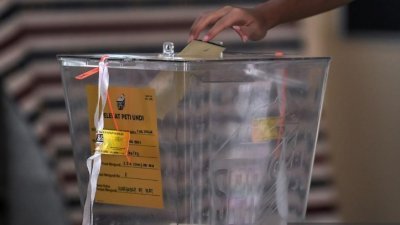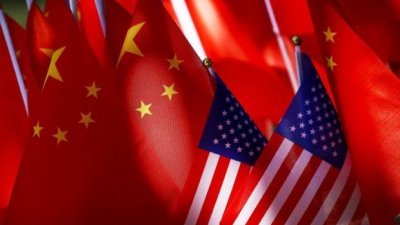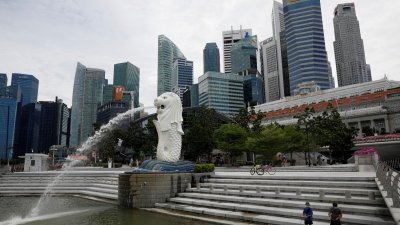大多数非马来人长期以来对马来西亚目前以种族为基础的政党体系感到失望。然而,当建议改变这个制度时,许多纸上谈兵的评论者,却认为这体系是不可改变的。
在当下的主要政党中,行动党和公正党是走多元种族政党路线的。然而,在这推动多元种族政治方面,两党并没有取得多大成功,因为在民众认知中,两党领导层和党员结构基本上遵循传统种族政党的形态和模式。早期,民政党的多元种族路线,也以失败告终。
因此,民众放弃了追求一个真正的从党员、领导层到党章,都代表著国家多元化种族的多元族群政党。许多人认为他们必须接受马来西亚政治现状,即当前的联盟政治和基于种族认同的政治。
未能创建一个充分认可多元族群和多元代表性的政党,以取代联合政府体系中基于种族或以种族主导的政党,已成为马来西亚的致命伤。这影响著一切。从候选人、政党宣言、竞选活动、内阁和政府的结构。所有这一切力量和动力都以种族为考量,而不是国家的多元种族情况。随之,他们必须回报各自的族群,并把这模式纳入国家政策。基于种族的政治和政党是马来西亚政治和遗产的一部分,也是阻碍这国家前进的绊脚石。
寻找新范式
第三股势力概念可能被视为是一种解决方案。然而,任何通过新政党打造的第三股力量,若与现有政党没有任何差异,是难于获得公众支持或胜选的。
马来西亚人口结构的变化表明,一个以马来人为中心,由种族和宗教政党组成的联盟,可能很快就会成为联邦和大多数州的执政党。这将使国家日趋种族与宗教化。当我们面对著这种种族主义趋势时,在世界其他地区却以新全球主义来面对。中东正逐渐放弃以宗教为中心方针,今天一些海湾国家就是例子。
许多国家也意识到,政治和政党不改革的代价,可能最终面对的就是人民起来反抗。马来西亚还没有发生过如此严重情况。然而,日益严重的人才流失,证明了人民的绝望和失望。今天大马人的的流动性比以前更高。如果当下的政治和由此产生的政治体制不变,马来西亚最优秀的人才,无论是马来人或非马来人,只会选择收拾行李离开这片土地。
尽管是联合政府,但以族群为中心的政府,将可能错失发展强大的新兴产业、吸引外国游客、留住高技能和资本充足的企业家,并帮助将与种族无关的创新力量,置于经济和社会的最前沿。
任何其他形式的进步政治或选举改革,例如选区重新划分或比例代表制,似乎是行不通的或不太可能的。在现行体制下,当权者根本没有兴趣或意愿去落实这一切。
可行且可实现的选项是,创造和激励真正以多元族群政治为目的多元族群政党,不管是改造自现有政党或创立新的政党,并以上阵第16届大选为目标。
从目前的朝野政治联盟中组建一个、两个甚至三个独立的多元种族政党,以上阵第16届大选,绝对是一个挑战。然而,我们认为这并非不可能。我们也相信,现有体系演变下,多个且分化的政党联合成一个相互竞争的单一多元种族政党,能够而且将会获得广泛的公众支持——即使这无法在第16届大选中实现,也会在下一届大选中成功。
我们的建议独特之处还在于,这可成一个新的、更强大的平台,凝聚当下半岛和东马日益疏离的关系。把地域和种族政党合并成一个多元族群政党,其将可取得全国而非区域选民的支持,这不只有助于化解分离主义情绪。其还可以加强族群互助和团结。即使落实了比例代表制或消除了选民分配不当情况,也很可能无法取得如此成果。
多元种族政党
马来西亚要摆脱不合时宜的,基于种族和宗教的政党之唯一方法就是建立一个公开、明确的多元种族政党。如果做到这一点,将比目前由一到两个种族政党主导的局面,向前迈出一大步;当下的多元族群主义只被视为一种表面现象或象征形式。
任何能够在大帐篷概念下崛起的多元种族政党,其党员必须来自不同的种族和地理区域,并为国家共同利益而合作,把种族和宗教利益屈服于更大的国家利益。
除了对这个概念泼冷水的专家外,可能还有一些力量会反对这个概念,反对改变现有政治联盟中的政党结构。至于其他障碍,一些是不可预见的。但如果当前政党的领导层和党员愿意打破种族隔阂,并且相互合作,开始将政党重置为单一的多元种族实体,这一切难题都可一一克服。
对于依然计划在第16届大选上阵的现有政党领导层应该意识到,他们被视为不想让新一代崛起的政客,并想要透过现有的制度来保住权力。在现有政党体系权位中,被排挤出来的各族群年轻人才,他们可以在我们建议中的新多元种族政党,更快和更易崛起。
他们可通过以多元种族党员组成和追求多元族群政治议程的政党支持而崛起,这可以成为马来西亚追求更有凝聚力国度和更光明未来的关键因素。
本文是作者与默里汉特联合撰写。
林德宜《重组多元种族政党 拯救大马》原文:Reconstituted multiracial political parties can rescue Malaysia from the dark forces
Most non-Malays have long been disillusioned with the present race-based party system in Malaysia. However, when proposals are put forward towards changing the system, many armchair critics knock down these ideas as being undoable.
Within the group of major political parties today, the DAP and PKR were founded with the principle of being multi-racial. However, both experiments have not been successful as public perception sees their leadership and membership as basically following the dynamics and mold of the traditional racial parties. Another earlier experiment in Gerakan also has been a failure.
As a result, members of the public have given up on the idea of a genuine grassroots based multiracial party with membership, leadership and agenda that are fully representative of the nation's diverse racial stakeholders. Many feel they have to live with the reality of the status quo in Malaysian politics with its current mix of coalition and race-based identity politics.
This failure to establish fully recognizable and representative multiracial parties in place of the racially based or racially dominant ones in the coalition system has become the achilles heel of Malaysia’s politics. It affects everything else. Candidates, party manifestos, campaigning, the composition of cabinets and government. All these forces and dynamics become racially based rather than multi racially based. And they have to reward and justify to their respective racial constituencies subsequently in national policy making. Race-based politics and political parties that are part of Malaysia’s political culture and heritage is what is holding the nation back.
In search of new paradigms
The concept of a possible third force has been touted as a solution. However, creating any third force with new parties that are unchanged in any meaningful way from the existing parties has not generated public support or enjoyed electoral success.
Changing demographics
Malaysia’s changing demographics indicate that a Malay-centric coalition made up of racial and religious parties may soon become the natural government at the federal level and in the majority of states. This will take the nation on a more pronounced ethno-religious trajectory. This ethno-nationalistic trend is occurring while the rest of the world has adopted a neo-globalistic view of the world. Middle East countries are drifting away from their religion-centric stances with some of the Gulf States as living examples of this today.
Many nations have also realized that the cost of not reforming politics and political parties could end in a revolt by their citizenries. Nothing as drastic as that has happened in Malaysia yet. However, hopelessness and despair is taking its toll as evidenced by the increasing brain-drain. Today the mobility of Malaysians is much greater than before. Malaysia’s best talent, both Malay and non-Malay will just pack up and leave if politics and the resultant political system remain unchanged.
Ethno-centric governments even in coalitions may miss economic opportunities in developing strong emerging industries, attracting international tourism, retaining highly skilled and capitalised entrepreneurs, and helping to place race blind innovative forces at the forefront of the economy and society.
The probability that any other form of progressive political or electoral reform such as constituency redelineation or proportional representation can be undertaken appears to be a non-starter or is highly unlikely. Under the current system there is just no interest or willingness by those in power to undertake such an endeavour.
The feasible and achievable option would be to create and incentivise genuine multi-racial politics that is based upon purposely and deliberately formatted multi-racial parties that draw on the existing parties or new ones intending to contest GE16.
Creating one, two or even three separate multi-racial political parties from the current coalitions in government and the opposition to contest in GE16 is definitely a challenge. However, we are of the opinion that this is not impossible. We are also confident that the evolution of the present system of multiple and fragmented parties in coalitions to one comprising competing unitary multiracial parties can and will receive widespread public support - if not in GE16, in the following one.
What is also unique in our proposal is that it can provide a new and stronger basis for bringing together the political constituencies from Peninsula and East Malaysia which have drifted apart as seen in the present development. The merger of geographical and race based parties and their convergence into unified multiracial parties drawing support from the national rather than regional electorate will not only help to defuse separatist sentiments. It can strengthen national solidarity and unity. This is a possibility which proportional representation or the elimination of malapportionment of electorates even if implemented would be unable to achieve.
Enter multi-racial political parties
The only way Malaysia can get away from the long past shelf life of race-based and religious based political parties is to move towards the creation of openly and explicitly multi-racial parties. If this is done, it will be a big step forward from the existing situation in parties in which one or two races are seen as dominant; and multi racialism is perceived as just a veneer or tokenism.
Any big tent multi-racial political party that can emerge from this must be based on membership from different races and geographical areas joining together and working together in the interest of a common national electoral agenda in which racial and religious interests are subordinated to the larger national good.
The forces against and for multi-racial political parties
Other than the pundits who will throw cold water on this concept, there are likely to be forces that will resist any change to the current party configuration in the prevailing coalition systems. Other hurdles, some unforeseen, will stand in the way. But they can be overcome if the leadership and membership of the current parties are prepared to break out from their racial silos and work with each other to begin the process of reconfiguring their parties into singular multiracial entities.
The leadership of existing parties intending to engage in GE 16 should realise that they are increasingly seen as a generation of politicians who do not want to let the new generation rise through the ranks and who want to hold on to power through the existing system. Young multi racially oriented talent kept away from the inner sanctums of power and position in the existing party system today can emerge more quickly and easily in the new multiracial parties that we propose. Their emergence backed by the multiracial membership and multiracial electoral agenda of these reconstituted parties can be the definitive game changer that Malaysia needs for a cohesive and brighter future.
Cowritten with Murray Hunter
要看最快最熱資訊,請來Follow我們 《東方日報》WhatsApp Channel.









.jpeg/89663802baf7d93b5c0eb414a8efc342.jpeg)








